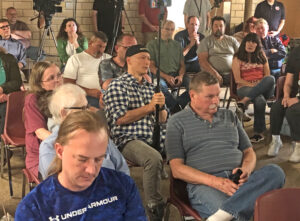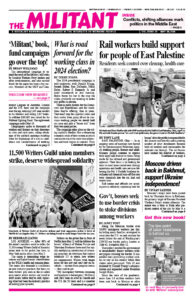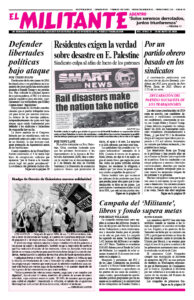EAST PALESTINE, Ohio — In an ongoing series of meetings here hosted by the Environmental Protection Agency, working people, farmers and small-business people continue to express their anger and distrust at claims being made by the railroad and government agencies. Their focus is on looking for ways to exert more control over cleanup operations and health care services following the Feb. 3 Norfolk Southern derailment and chemical burn-off that sent toxic chemicals into the air, land and waters here.
Rail unions and officials are speaking out in solidarity, explaining how the bosses’ drive for profits is responsible for this disaster and how this and a growing number of other derailments threaten both rail workers and communities the railroads run through. The rail bosses have slashed the number of workers, ignored needed maintenance, instituted more and more on-call 12-hour shifts with little time off, and run 200-plus car trains containing hazardous waste.
Militant worker-correspondents Candace Wagner and Tony Lane showed people here the recent Sheet Metal, Air, Rail, and Transportation Workers — Transportation Division union paper with its headline, “Rail disasters make the nation take notice.” It was featured in the Militant.
Mallory Aponick, disaster services coordinator at the First Church of Christ, was in the middle of dispensing a third donated shipment of air purifiers. She told us 500 more units are coming, and “that will take care of everybody who wants one.” As supplies come in, she works with a local agency to “tell people that food has come in, there’s cleaning supplies, get people to come down.”
Aponick said she supports rail workers, that without trains and trucks nothing gets shipped. But, she said, the rail bosses “are making money hand over fist.”
In the “Flowers Straight from the Heart” shop, owner Joy Mascher described the situation people face as the cleanup crews dig up contaminated soil and it gets tracked around town. “It’s a real mess, they have pads on the streets, a lot of dust, sweepers constantly cleaning the streets.” She told us that they are now talking about finding more contamination from the area where the toxic vinyl chloride was burned off.

There was a crowd of some 50 residents jammed into the fourth weekly “informational session” held by the EPA May 11 that we went to. At the presentation on cleanup in area streams, Ohio EPA Water Quality Supervisor Bill Zawiski was met with skepticism and challenges.
A contractor — CTEH — is testing the water. “They may be the contractor but who pays them? Norfolk Southern does,” East Palestine resident Jami Wallace said. “How do you expect us to take these results seriously when you are letting the person that did this be the ones that tests it?”
“Step out of your EPA gear and imagine yourself as an East Palestine resident,” Linda Murphy added. “Norfolk Southern has not been transparent, not been accountable and not been honest.”
It is the actions by workers and others here like at this meeting that has won every concession the rail bosses and government agencies have been forced to make. They’re pressing for more facts and more action.
“I know there are concerns that we’re painting a picture that everything is good,” EPA spokesman Mark Durno admitted, “but we recognize there is still a lot of contamination out there.”
The agency officials confirmed there is still contamination in Leslie Run and Sulphur Creek, the two waterways directly affected by the disaster.
Residents brought up many other questions. Rick Tsai asked why they excavated under the railroad tracks and not the burn pit, and what was going to be done with that.
For the first time, Durno said they have begun to excavate the burn pit, and they “had to go deeper, there was higher levels of contamination.” He admitted a neighboring ditch was being dug out as well, confirming it was contaminated.
There was also discussion on another Norfolk Southern derailment the night before in nearby New Castle, Pennsylvania. Nine cars in a 216-car train went off the tracks on a rail bridge over the Mahoning River and spilled soybeans and paraffin wax. Authorities say no hazardous material spilled into the water. Because of the length of the train, crossings were blocked for hours in small towns south of the derailment.
Norfolk Southern had told area residents they would run shorter trains there, but the train that derailed in New Castle was over 50 cars longer than the one that polluted East Palestine.
Nebraska rail workers speak out
After reading the SMART News about the Ohio derailment, two Lincoln, Nebraska, rail workers decided to turn to their unions to back workers and farmers of East Palestine in their fight against Norfolk Southern and the government.
“We recognized that unless workers and their unions play a central role in supporting the working people of East Palestine, eventually their fight will fall apart, and more disastrous derailments will follow,” Jakob Forsgren, a track repairman, welder and chair of local Lodge 1320 of the Brotherhood of Maintenance of Way Employees, and conductor Lance Anton, a member of SMART-TD Local 0305, told the Militant.
Since the Feb. 3 derailment in East Palestine, nearly 40 other significant derailments have been reported on Class 1 railroads, including a few in Nebraska.
They drew up and took a message of solidarity along with copies of the SMART News headline to their local union meetings — which endorsed it — and to the Lincoln Labor Council. Then they sent copies to the Nebraska AFL-CIO president and to the SMART-TD News, their national union leaderships, as well as labor councils and newspapers like the Salem News in and around East Palestine.
Rail union members “value the fight of working people of East Palestine as you continue to press to gain control over all the needed steps to clean up the area since the February 3rd derailment and protect your health long-term,” the message, endorsed by the two union locals, says. “Your fight is our fight as members of the SMART-TD unions unite with working people that live and work near railroad property to make our living and working conditions safer.”


